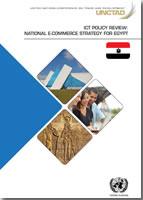
E-commerce is expanding rapidly in developing countries. As more goods and services are traded online, it becomes increasingly important for enterprises to have an online presence.
E-commerce is facilitated by improved connectivity and the rapid proliferation of mobile phones, social media and new innovations. At the same time, many developing countries need to overcome various barriers to seize the full benefits from the evolving digital economy.
UNCTAD’s ICT Policy Review Programme supports countries seeking to formulate a national e-commerce strategy through effective diagnostics, policy advice and customized strategy development. Egypt is the first country to benefit from the use of the ICTPR integrated e-commerce diagnostic framework.
Egypt has a consumer market of more than 90 million people, most of whom are younger than 30 years of age and increasingly technology-savvy. Internet penetration stands at 37.8 per cent, implying one of the largest populations of prospective online shoppers in the Arabic-speaking world. However, due to several barriers and challenges, e-commerce has been slow to take hold, and its potential is still largely untapped.
At the request of the Ministry of Communications and Information Technology (MCIT) of Egypt, UNCTAD is proud to have been given the opportunity to develop this national e-commerce strategy. It seeks to leverage Egypt’s strengths while tackling the bottlenecks and challenges that impede e-commerce in the country.
The publication sets out six sub-strategies, recommendations aimed at strengthening Egypt’s performance in key policy areas, and six megaprojects. It is supplemented by an action plan to support the implementation of the strategy. Through these measures, the new strategy will help Egypt to position itself for more e-commerce and more benefits from e-commerce.
On behalf of UNCTAD, I would like to express our appreciation for the excellent collaboration with MCIT, other government offices, the private sector and civil society in Egypt. The strategy development has also benefited from partnerships and cooperation with the World Bank and several other United Nations agencies.
My hope is that the analysis and recommendations contained in this report will make a valuable contribution to Egypt’s efforts at leveraging e-commerce for economic growth, job creation and socioeconomic prosperity. I warmly commend those involved in the strategy development at UNCTAD, the Government of Egypt, and all the partners and collaborators for their efforts.

UNCTAD Secretary-General


